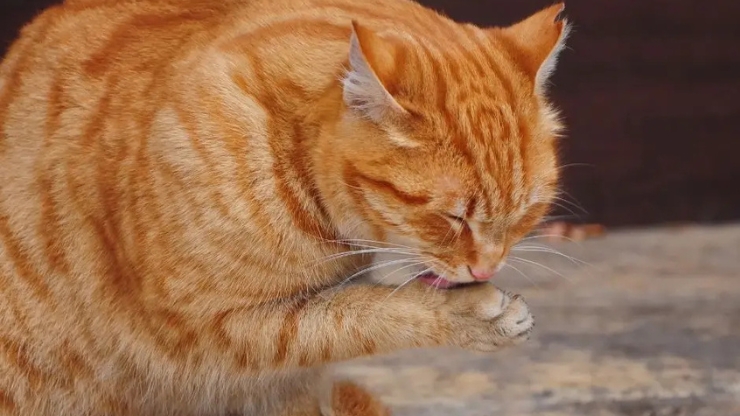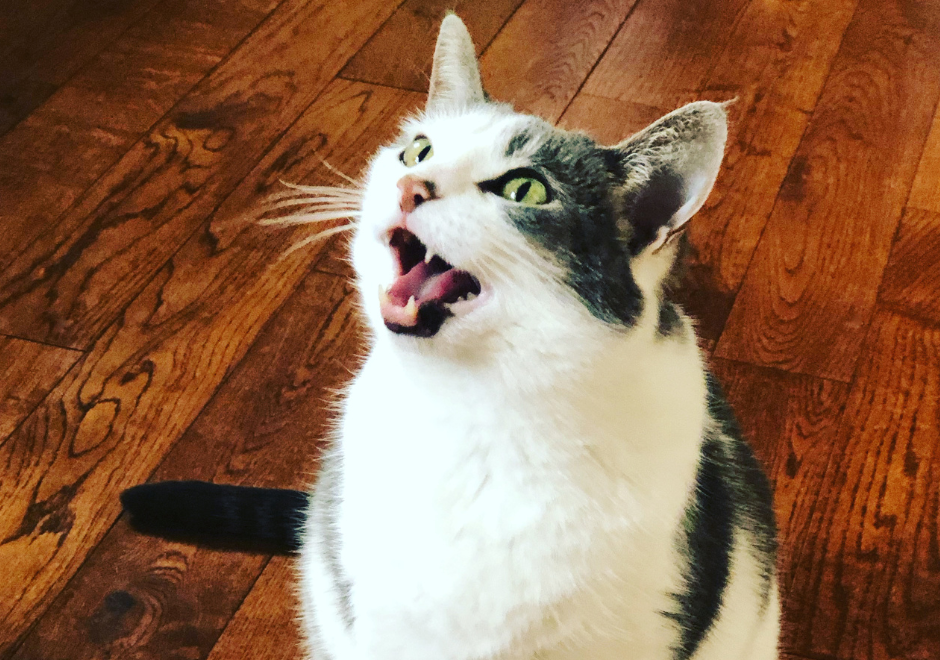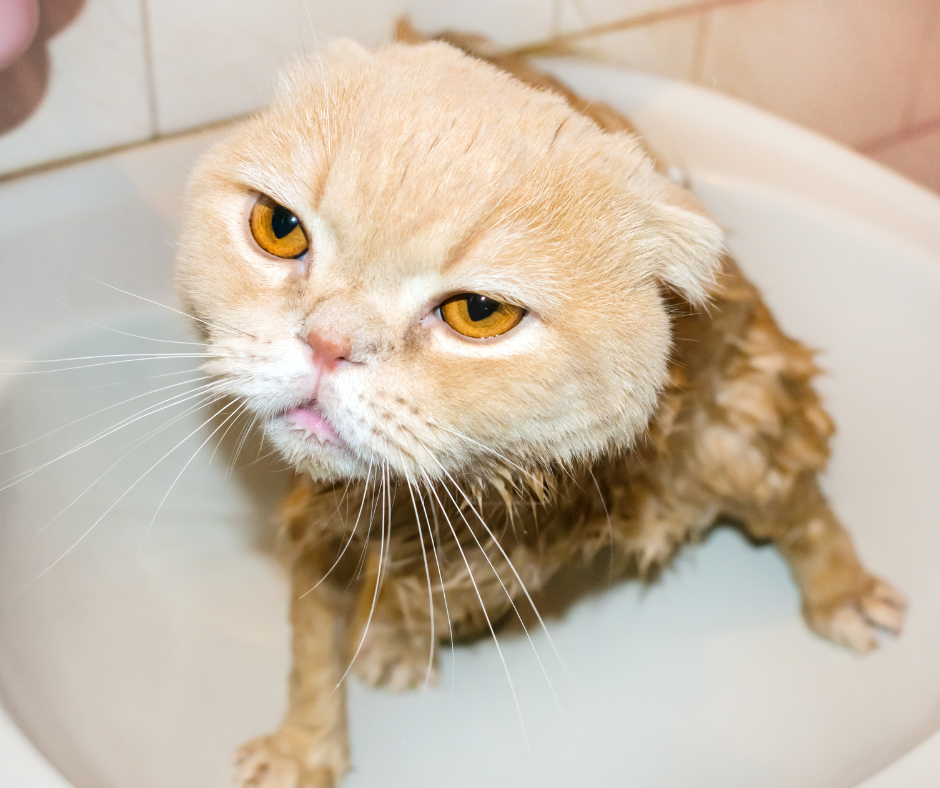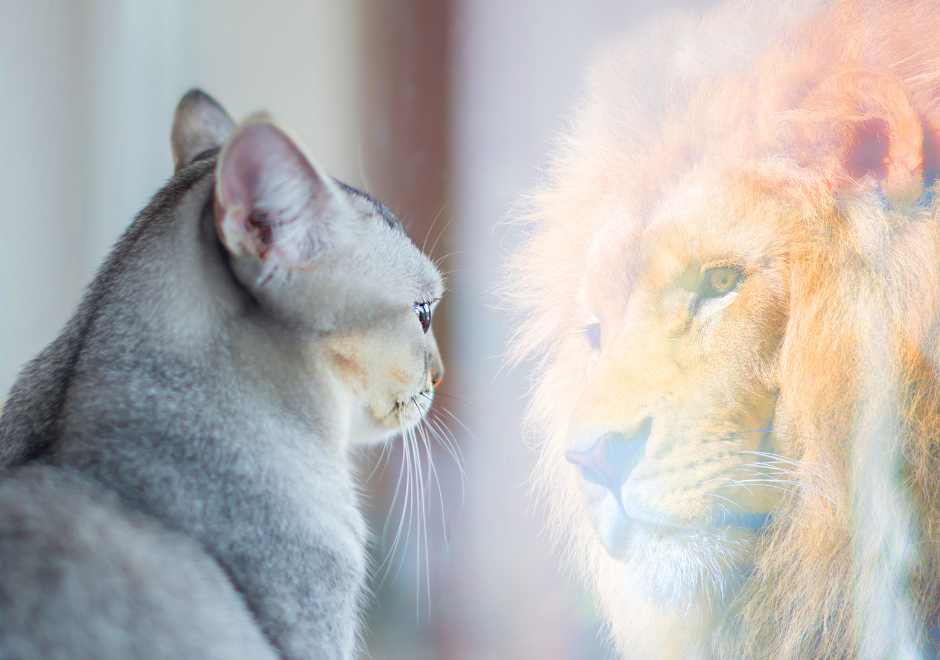This article may contain one or more independently chosen Amazon affiliate links. See full disclosure.
Most cat people have noticed that cats pick the strangest times to suddenly start grooming a paw or licking themselves at random places on their body. For example, have you ever seen this happen? Your cat is having a play fight with your other cat, he reaches out to swipe her on the head, and instead, he pulls his paw back and starts licking it. Or, in the middle of an intense stare-down with his playmate, he looks away and starts licking. Why do cats suddenly groom at odd times like this?

Then, there is the embarrassment grooming. Your cat tries to leap onto some piece of furniture, misjudges the distance, and has a bit of a pratfall. So, he starts grooming himself as if to say “that never happened, I’m just sitting here grooming.”
This kind of grooming activity happens all the time. Random grooming is the rule, not the exception. If you call your cat over, she may pause to groom before she finally decides to come over to see if you have anything interesting to offer.
Feral cats do this often when confronted by humans. When we see a cat outdoors and try to get its attention, it will often look away and nonchalantly lick its paw.
It is not really being nonchalant or indifferent, but this kind of behavior certainly helps lead to the cat’s reputation of being cold and aloof. What is happening is that you have made the cat nervous, or uncertain, and they are taking a moment to comfort themselves and sort things out.
Grooming As Displacement Activity
All of these sudden and seemingly misplaced grooming activities fall under a phenomenon that cat behaviorists call displacement activity. These are any behaviors, often body-care activities, that seem irrelevant to the activity that has been going on.
Humans do the same thing. You are in the middle of a heated argument with someone and they look away distractedly and start picking at their clothing or some similar activity.
Other primates do this also, and other mammals, in general, do this. It annoys us when other people do it but when cats do it we find it cute and funny.
We often think that when a cat acts this way they are embarrassed. But, can cats feel embarrassed? Many sources claim that they do feel embarrassment, but these sources are simply relying on their own interpretation of cat behavior, just as we do.
Like most human emotions assigned to cats, we may never know, since cats cannot tell us how they feel. Any claim to the contrary is simply false and quite unlikely.
Cats do tend to have patterns with their regular grooming, and this same pattern is seen in both the outdoor wild cat and the house cat. For the wild or feral cat, it is hunt, eat, groom, sleep, repeat. For an indoor cat, ideally, it is play, eat, groom, sleep, repeat.
However, cats spend a whole lot of time grooming in general. In fact, they may spend up to half their waking time grooming.
My Cat Has a Dirt Sensor!
At my house, we sometimes joke that our cat’s dirt sensor has gone off. Oops, dirt detected, must groom! But of course, cats don’t have a dirt sensor and these random and short licking sessions that fall outside regular, more thorough sessions can better be compared to a self-comforting activity or a nervous tick.
Cats do this when uncertain about a course of action to take, when there is conflict, and when bored or frustrated. They seem to do it when embarrassed as well, but we really cannot know whether cats feel embarrassed.
Perhaps they simply feel frustrated when something doesn’t go their way. You can think of it as being similar to a human biting their nails.
Hopefully, your cat’s displacement grooming happens only in short bursts and odd intervals. If it begins to happen continuously and turns into over-grooming, this may be a sign of chronic anxiety in your cat.
If this happens, you need to address the source of anxiety. You may also need to rule out an itchy skin problem.




